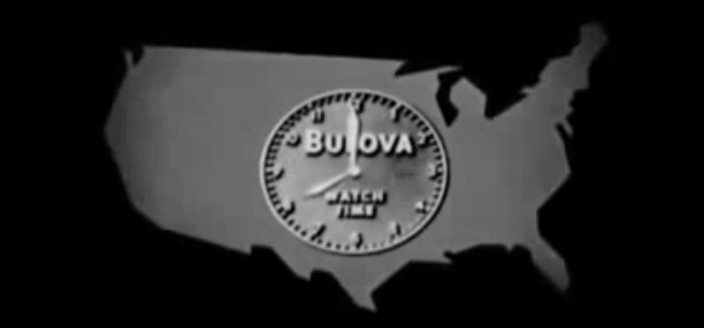The World’s First TV Ad: Featuring Bulova watches

httpv://youtu.be/Ss6v5bpxODo
The first TV commercial — the first legal one, at any rate — aired in the U.S. on July 1, 1941. It was a shaky, 10-second spot for Bulova, a watch and jewelry company that had been founded in New York 66 years before.
“America runs on Bulova time,” a voice says, showing a gray outline of the 48 states emblazoned with a Bulova watch face. It was a slogan many Americans had already read in print or heard on radio. In fact, Bulova also broadcast the first national radio commercial in 1926 with a similar tagline: “At the tone, it’s eight o’clock, B‑U‑L‑O‑V‑A Watch Time.” It was a commercial the companysays was seen by “millions.”
Bulova’s first TV ad didn’t reach nearly as many people. Although TV broadcasting kicked off in the U.S. in 1928, the FCC didn’t grant commercial licenses to TV stations until May 2, 1941. Those licenses went into effect on July 1. On that day, NBC-owned WNBT went live. The Bulova commercial aired at 2:29 p.m., leading into a baseball game between the Brooklyn Dodgers and the Philadelphia Phillies.
“[The commercial] wasn’t filmed at all, as far as I know,” a spokesperson for Bulova told Mashable in an e-mail. “It was just the graphic and the live voice-over.”
“As to why we did it, I suppose that’s because we took pride in being a pioneer in marketing,” the spokesperson added.
The spot cost Bulova all of $9: $4 for airtime and $5 for “station charges,” according to American Heritage magazine. (Presumably its agency, Biow Company, took a slice of those “station charges.”) The commercial only reached, at best, a few thousand people: Only 4,000 TV sets had been installed in New York at that time.
We mentioned early that the Bulova spot was the first “legal” TV commercial. Two years before, NBC ran “experimental” advertisements for three companies — Procter & Gamble, Socony Oil (now Mobil) and General Mills — also during a Dodgers baseball game. As recounted by AdAge, the game’s announcer, Red Barber, demonstrated products from all three companies, donning a gas station attendant’s cap, holding up a bar of P&G soap and slicing banana into a bowl of Wheaties cereal. NBC was apparently able to escape FCC fines because all three companies were radio sponsors of the Dodgers; the TV plugs were simply bonuses for their support (something we still see a lot of today.)
TV advertising remains a robust business, and one that’s proved almost entirely resistant to the advent of online advertising. U.S. advertisers are expected to increase their spending on TV this year by nearly $2 billion to $66.35 billion, according to forecasts from eMarketer. By 2017, that number is expected to reach $75 billion, an increase of 14% over five years.
Meanwhile, Bulova is still creating TV ads. However these days, the brand is breaking the ads the way many do in 2013 — on Facebook.